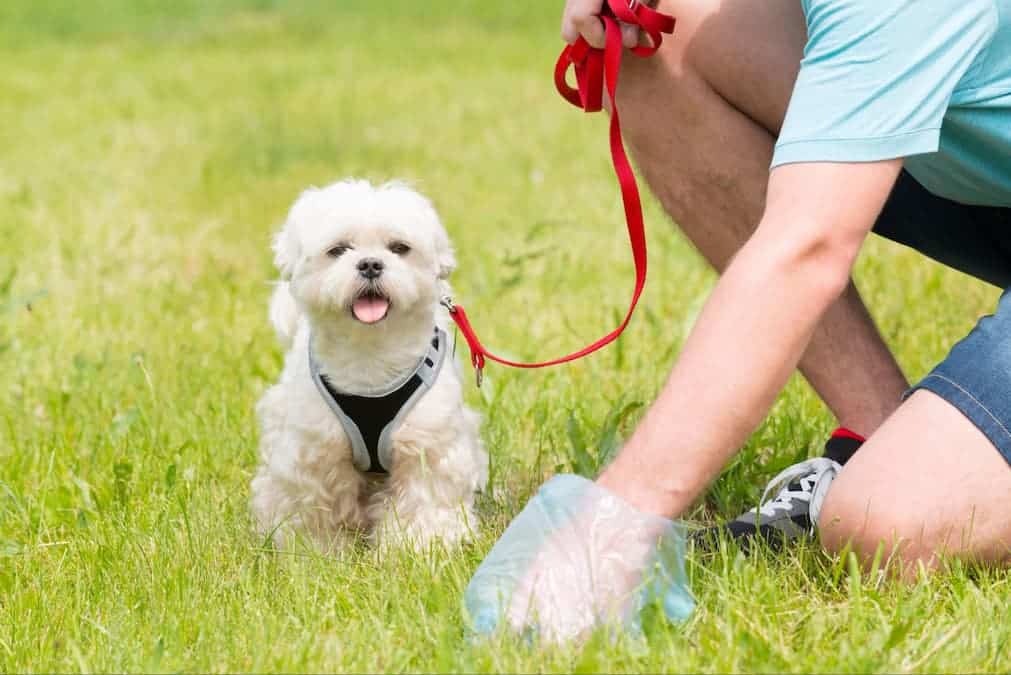Hookworms are dangerous parasites that live in a dog’s small intestine. With remarkable efficiency, hookworms “graze” on the lining of the intestine, leaving multiple bloody holes in their wake. These can lead to anemia and may even cause a small puppy to bleed to death. In humans, hookworms migrate through tissue close to the skin, causing painful, itchy rashes.
How Do Hookworms Work?
The adult hookworm resides in the host’s GI tract, specifically the small intestine, and it feeds on the host’s blood by attaching itself to the intestines. Reproduction and mating occur in the GI tract, and the female releases its eggs into the host’s fecal matter. After being deposited on the ground or soil, the eggs undergo multiple stages of development and then spread to infect others through various means.
After entering the host, the hookworm travels through the tissues to reach the lungs. From there, it can be coughed up and re-swallowed to continue its lifecycle in the small intestine. Reproduction occurs during this process.
Hookworms can become encysted during their migration in the body. This means they become dormant and inactive for a while, only to periodically “wake up” and start a destructive cycle again. When a dog is pregnant, hookworms can migrate to the mammary glands and be ingested by the pups, and they can also pass to the puppies through the placenta.
Three Common Types of Hookworms
- Ancylostoma caninum is the most pathogenic hookworm and can cause anemia in infected dogs. Like other hookworms, it poses a zoonotic threat to humans and can cause creeping eruptions.
- Ancylostoma braziliense is a hookworm species that can infect dogs and cause creeping eruptions in humans who contract it.
- Uncinaria stenocephala is typically found in a host’s small intestine and usually targets dogs, but it can also infiltrate cats and foxes and cause creeping eruptions in humans.
Who Can Contract Hookworms?
Both dogs and humans can get hookworms. Here’s some more information about hookworms in dogs and people:
Dogs
Hookworms can worm their way into unsuspecting dogs through several parasitic means. A dog can accidentally ingest their larvae in contaminated environments such as backyards and dog parks. They can penetrate a dog’s skin that unknowingly steps through the dewy grass where hookworms hide.
It is important to note that some dogs are at higher risk of developing severe illnesses from hookworm; these groups are:
- Canines in crowded settings like shelters or boarders
- Dogs with previous health conditions
- Puppies
Humans
People become afflicted with hookworms by walking through contaminated areas with bare feet.
Causes of Hookworms in Dogs
There are multiple ways that your pet can come into contact with hookworms. One way is in utero before the puppy is born and, along those lines, through the mom’s milk.
If your furry friend lies in contaminated soil, the hookworm can latch onto their skin. Contact can also happen if your pup drinks from contaminated water or eats contaminated soil or feces.
Signs of Hookworms
Dogs: How can you tell if a dog is infected with hookworms? Only a veterinarian can tell for sure, but signs to look for may include weakness, weight loss, diarrhea, and pale gums.
Humans: In people, hookworm infection typically causes itchy red tracks on the skin where the worms have been traveling just beneath the surface.
How To Diagnose Hookworms
For canines, the hookworm test is commonly done in animal hospitals. First, the feces are mixed with a chemical and spun down. Then, the sample is examined under a microscope to check for the presence of oval eggs, which are characteristic of hookworms. When reviewing a larger quantity of feces, there is a higher probability of detection.
For humans, hookworm diagnosis can be confirmed by identifying hookworm eggs in a stool sample. Concentration procedures are recommended for light infections, as eggs may be difficult to find.
Treatment of Hookworms
Treating your dog with a veterinarian-recommended product can eliminate pre-existing populations of hookworms and reduce the incidence of re-infection by these parasites. Monthly administration can reduce the risk of re-infection by reducing the burden of hookworm larvae in your dog’s environment.
Dogs with severe anemia and accompanying conditions like pneumonia may require more advanced treatments such as:
- Additional medications
- Blood transfusion(s)
- IV fluids
- Vitamins or supplements
- Increase in protein
- Special diet
Dogs: A veterinarian can help deworm an infected dog. Deworming medication must be administered to kill the hookworms and may need several rounds.
Humans: Human infection can be treated with medicine if detected early. If it’s not detected early, serious medical complications can develop. Be sure to contact your physician or pediatrician, especially if it’s a child that you believe is infected.

How to Avoid Hookworms
Treating and controlling hookworms in your dog is as easy as ensuring that the heartworm preventive you give your dog also treats and controls hookworms. You can take other precautions to prevent this nasty parasite from infecting you and your pet.
- Maintain a clean environment
- Clean your yard of dog waste
- Prevent dogs from eating fecal-contaminated material
- Give your furry friend high-quality dog food
- If you notice any symptoms, treat them immediately
- Decrease stress in your pet’s life
- It is recommended to have your dog undergo examinations and stool exams by a veterinarian at least twice a year and more frequently if you have a young pup.
- Block access to areas of the yard prone to hookworm infestation.
- To reduce the chances of transmission from mother to pups, it is recommended to administer an approved product to pregnant dogs daily during the last trimester and for several days into nursing.
Preventing the Spread When Your Dog is Diagnosed with Hookworms
If your dog has been diagnosed with hookworms, there are preventative measures you can take to lessen the risk of other dogs and your family from contracting the parasite. Some of these precautions include:
- Do not share bedding with your furry friend.
- If you believe you’ve acquired a hookworm, immediately contact your primary care doctor.
- When cleaning feces, wear disposable gloves.
- Immediately clean the area where your dog has defecated.
- Not walking barefoot or sitting in dirt or sand that is contaminated.
- Have a good hygiene routine in place.
Commonly Asked Questions About Hookworms
Can Humans Get Hookworms from Dogs?
Yes, humans can get hookworms from dogs. If your pet has hookworms, hookworm eggs can pass through your dog’s feces and into the environment. If you’re in the environment, you risk infection. Hookworms can also be passed when your dog licks you: it may be best to rethink those kisses.
Are Hookworms Deadly?
Puppies are at a higher risk of dying from hookworms, but older dogs are also prone to the issue. Dogs who are not on a schedule of deworming are at risk too.
How Do I Know My Dog Has Hookworms?
Most times, you will not know if your furry friend has hookworms. More often than not, the heartworm meds you give your pet can help with deworming. It is recommended that you have your dog tested twice a year for parasites.











